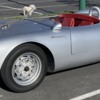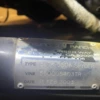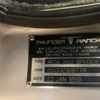seems to be getting mileage mixed up with kilometers
Replies sorted oldest to newest
Vintage Spyder I think. Vintage chassis. Coil-overs on the rear.
He also said the owner has had it for some time but hasn't been driving it. It could have been a partial roller that the owner built/finished. I can't imagine the owner gave him bad info when he dropped the car off and he said it was a Beck at least a dozen or more times.
If Beck made cars with what we now know as the "Vintage" chassis I suppose Carey will chime in and correct me. They could have! The Beck Spyder was called the "Vintage 550 Spyder" at some point—at least according to their tags.

@americanworkmule posted:I don't think Beck frames have this roll bar extension ?
Who knows with this car.
My roll bar is two pipes welded to the torsion bar tube. The roll bar itself slips into them. (barely) And it goes through the bulkhead in back of the firewall.
Attachments
@edsnova posted:If Beck made cars with what we now know as the "Vintage" chassis I suppose Carey will chime in and correct me. They could have! The Beck Spyder was called the "Vintage 550 Spyder" at some point—at least according to their tags.
I don’t think the frame has ever changed since the first ones Chuck built.
Definitely one of my earlier cars.
Not a Beck.
And yes, the Beck Spyder was called the Beck Vintage 550 Spyder at first and then when Vintage Spyders came out Chuck decided to drop the word Vintage from the Beck name so there was no confusion, and then later the 550 was dropped when Porsche trademarked it. Thus the official trademark became just "Beck Spyder" and is now incontestable.
I do know that there was one "Veck" made. I believe it was Joe Maddock(maybe?) that had a Beck Spyder. He brought it to Greg and the back end was cut off and the Vintage frame was welded in from the firewall back. It was a one off for sure.
The easiest tell is the clamshell release lever. If it's on the firewall by the driver door and is billet aluminum, the car is most probably a Vintage. If there is an under-dash hoop with a flat plate on the passenger side and two stubs for a roll-bar, it's a Vintage. The coilovers are a great indicator, but it's a tossup on which manufacturer unless there is ALSO a 2" spaceframe in back rather than the 3" ladder frame of the Beck.
I've been following these cars since 1984(I was 20), and got Chuck's brochure and price list from that era. I discovered Vintage in 1996 and got his price/option sheet along with some 4 x 6 photos in an envelope of a black Spyder with tan interior that he had just done. I finally ordered a painted roller in 2001 from Greg. I never did contact TR, I figured I'd rather go with Beck or Vintage.
I saw 5 Beck Spyders at the Litchfield Bug show in 1991. I was beyond hooked at that point.
This thread is funny to me as I get all sorts of people who think they know what my car is. "Is that a Beck?" is most often, second only to "Is that a Becker?". That second one is funny because Becker made or makes radios that happened to end up in Mercedes cars. Or, what year pan is that on? Umm, there is no pan. Puzzled brain-exploding expressions appear...
My personal favorite "Is that a kit?" Well, no. It didn't come in a box with instructions and glue. And don't get me started on the idiotic JD reference. My reply to that lately is no, JD is dead, how can this be his car? And "Is that real?" is the absolute best LOL!
I've just listed 99% of the reasons I eschew car shows.
I did attend an all VW/Porsche fall foliage cruise this past weekend. It was about 75 VWs. Lots of Bugs, some ovals, verts, Ghias, a couple type3s, buses of all years and configurations, one pristine single cab, a couple Bajas, a couple things, and one dune buggy. And then there was me. Not a single 356 or 911 or 914 there.
Obviously, it was a pretty slow cruise. But it was still fun. 33F in the morning, the heater did it's job especially keeping the windshield clear! Everyone was very interested and complimentary, except one guy that wanted to attempt to be the smartest guy in the room. He told me I had a "Formula Vee shifter". Umm, no, it's a PBS shifter. But, I have an FV too and they ALL have a rod shifter not a cable. The cockpit is too small for a shifter box and two cables. He shut up after he figured out that I built the car and knew every part on it. Then he says "Is that a dry sump tank?" and I said yes. No more was heard after that.
I watched the entire video. It is pretty close to my old 2001 Vintage. CSP front wide-5 discs, and it's got 356a/b rear drums on it. And I see the Brandwood cable shifter also.
You can also see the shoulder harnesses that are wrapped around a structural frame member that goes across the engine side of the firewall. That's a HUGE Vintage tell.
Hey "Wizard", those are brake cooling ducts. See where they point to? You know, the back side of the front discs?
Good to know, Carey. I stand corrected. I've never seen one of your cars with that feature.
It's all good.
No worries,....as long as that hoovie guy ain't driving it and tearing it up!!
@DannyP posted:The easiest tell is the clamshell release lever. If it's on the firewall by the driver door and is billet aluminum, the car is most probably a Vintage.
My home built Beck came with a piece of bent strap steel and a cabinet hinge that bent under the pressure of pulling against the springs of the latches.
I replaced it with one of Greg’s elegant billet levers, although mine is mounted to the frame rail, not the bulkhead.
In regard to 550 Spyder-shaped objects, "Beck" is like "Kleenex" is to "facial tissue" or "Windex" is to "glass cleaner" or "Xerox" is to "photocopier"—a brand name that is commonly used as a generic.
@edsnova posted:In regard to 550 Spyder-shaped objects, "Beck" is like "Kleenex" is to "facial tissue" or "Windex" is to "glass cleaner" or "Xerox" is to "photocopier"—a brand name that is commonly used as a generic.
I can see that with the gen pop, but it’s hard to imagine the proud owner of a Vintage or TR would make that mistake.
@dlearl476 posted:I can see that with the gen pop, but it’s hard to imagine the proud owner of a Vintage or TR would make that mistake.
Thunder Ranch referred to their version of a Spyder as the Beck 550 Spyder
Attachments
@americanworkmule posted:
That's just weird, but Tom McBurnie was something else.
@americanworkmule posted:
Only until they got a cease and desist from Special Editions.
IIRC, Carey covered it in another “What Spyder is this Spyder” thread.
As a proud TR Spyder owner, when people ask me if it's a Beck (and they usually do) I tell them "no it's a knock-off of a Beck," adding that it's nearly as good.
@edsnova posted:As a proud TR Spyder owner, when people ask me if it's a Beck (and they usually do) I tell them "no it's a knock-off of a Beck," adding that it's nearly as good.
did you get a cautionary letter from Special Edition advising you to describe your car that way? ;-)
Attachments
@dlearl476 posted:Only until they got a cease and desist from Special Editions.
IIRC, Carey covered it in another “What Spyder is this Spyder” thread.
which specific thread is that?
there is about one of those every six months, IIRC
@edsnova posted:As a proud TR Spyder owner, when people ask me if it's a Beck (and they usually do) I tell them "no it's a knock-off of a Beck," adding that it's nearly as good.
Perfect.
@americanworkmule posted:which specific thread is that?
there is about one of those every six months, IIRC
I have no idea. ![]()
Try searching for Carey’s posts.
@DannyP we use a similar billet clamshell release handle also, but ours is still mounted between the seats.
I can usually look at a car and decipher factory vs homemade as well as the builder/manufacturer. We all have our "tells" on the way things are done.
For those keeping track, here is a list I started that tries to show the largest differences in the 3 generations of Beck Spyders: As I think of new items I try and add them. thi swill eventually made it to the info section of our website.
Generation 1
Produced from 1982 to 1994 **note there is Gen 1 and Gen 2 overlap between 1988 and 1994
Body and chassis produced in CA
estimated 90% sold as base body/chassis “kit” and completed by DIY. Chuck only did hands on assembly for the first few years and then Randy Beck took over assembly while Chuck and Kevin setup manufacturing and tooled the Gen 2 car. Randy estimates that he only build a dozen “turn key” Spyders during this time.
MANY features non-standard and all left up to the end user
could be ordered with no holes cut or a pre-cut standard hole cutting package available
-lift off front hood (no hinges)
-universal marine flip style gas cap (available but not included)
-early turn signal and taillights were motorcycle lenses with custom spun alloy bezels (available but not included)
-door hinges were modified Ford Pinto hood hinges
-door swings completely outside of the body and do not stay open
-door latches were mounted to the inner face of the door, MGTD parts
-flat rear firewall (behind seats)
-battery box optional but located at the rearmost frame rail
-engine mount VW style bellhouse cradle
Generation 2
Produced from 1988-2015 first in Sao Paulo, Brazil, later in Jarinu, Brazil
note: from 2011(?) to 2015 all paint and interior was moved to Indiana facility. Assembly early was split between CA and TX facilities, later all moved to Indiana
-chassis paint switched to epoxy (former powdercoat)
-added front hood hinge and prop rod
-new style gas filler cap (better but not accurate)
-added top and side curtains
-steering column changed to 924 spline
-factory made (still primitive) wiring harness with glass fuses
-recess behind seats for added leg room
-vw interior door handle added for clamshell release, between seats
-engine mounts updated/stronger
improved rod shifter (early) and then cable shifter (later)
-modernized door hinges and added an A side door pocket, doors now open into the body cavity
-added door check strap to hold door open
(short run with hinges that had an internal spring in place of a check strap)
-door latch and striker changed to VW box style
-interior door pull cable added, later optional inner door handles available
-taillights were a Brazilian sourced conical light, amber in front and red in rear. original style lights were an added option in later years
-standardized battery tray box in the rear passenger side near firewall
-extruded aluminum windshield frame with top latch hardware
-extruded and formed lower windshield track
-turn signal switch update mid production to 3 arm with horn isolation, early had brass horn button on dash and single turn signal arm with dimmer button on end of stalk
-VDO (Brazil) gauges standardized, KPH speedo. VDO discontinued these in late Gen 2 production, various manufacturers used for a few years
-ebrake was beetle handle deep between seats
Generation 3
2015-present
Manufactured in Indiana
retains all fo the Gen 2 features with the added changes/specs
-front beam changed to Airkewld brand with improved 356 style adjusters and Delrin inserts
-option added for factory Subaru prep
-gas cap updated to original size and style
-pedals updated to Wilwood standalone for brake and clutch, throttle pedal changed to early 911, hydraulic clutch standardized
-cable shifter updated to PBS style unit with new style nosecone mount (best 550 shifter ever FYI)
-e-brake elevated for ease of use, original style also available
-4 wheel disc brakes standardized
-master cylinder changed to US available version, pedal board moved rearward 3/8” to accommodate
-wide five wheel/brake package standardized
-original style oil cooler grill standardized
-self holding rear prop rod standardized
-chassis painting switched back to powdercoat
-lower windshield track seal added
-interior door cable discontinued and release mechanism improved, handle still available also
-carpet improved to German Wool
-Cocomat floor mats standard
-leather upgraded to Katzkin
-original turn and taillights standard
-revised clamshell shape with lower fender profile, defined wheel well profile, flat smile in rear. original Beck tall fender clamshell still available on request
-clamshell release changed to billet aluminum, same location
-VDO gauges (India) standard again, digital odometer and GPS speedo. also various symbols added to gauge face (batt, oil, park) as required by VDO





